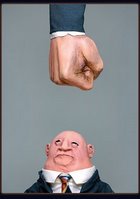I suppose this might be considered unpatriotic on "Presidents' Day" but I can't resist sharing this shot across the bow from Charles McNulty at the LA Times. While filed under "Oscar Preview" it is actually a subversive assertion of not just the values of "British acting" vs American (as if there were just something in the water there) but an implicit defense of the continuing importance of stage acting (and stage training) as part of a good film actor's makeup.
Now this is an old argument and one subject to continuous ongoing debate. But one canard that I hope can be laid to rest is some simple swipe at British actors (or indeed all stage actors) being too "big" or hammy for film. McNulty takes as his cue the fact this year's Oscar nom's--like so many in recent years--have favored so many Brit-performances that were hardly over the top; Helen Mirren and Judy Dench being this year's self-effacing examples that he dwells on most.
I like that McNulty also dares to take on the issue of intelligence in acting. Not that the Yanks are dumber. But that so much less is expected of actors in the US--that they are treated as dumber.
Artists enlarge our world, and art is an inescapable part of the landscape. Painting, poetry, music should be as real to our actors as the range of emotions they're so careful to catalog. When [Judi] Dench's Barbara [in "Notes on a Scandal"], a human-scale villain with Shakespearean cunning, mordantly describes the pupils in her school as "proles," one assumes that not only has this fearsome history teacher read George Orwell, but the actress herself is conversant with the author — and knows how to italicize a cultural marker for maximum effect. The same is true for Winslet in "Little Children," who, in playing a passionate woman trapped in a suburban New England version of Flaubert's "Madame Bovary," conveys a fine-grained literary understanding of her situation that's appropriate to her overeducated character.
One doesn't get this sort of intellectual frisson from, say, Leonardo DiCaprio, not because he doesn't read (I'm sure he had plenty of Joseph Conrad to dip into on the set of "Blood Diamond") but because the kinds of roles that often come with his level of stardom have little interest in these, shall we say, more delicate values. Action films don't have time to revel in the inner life, never mind the color, nuance and literary rumblings of words. Distracted by irony for too long, an adventure hero could easily find himself with a bullet in his brain.
It's important to understand this point beyond a "they're smart/we're dumb" schematic. The difference is between two cultures. I suppose, for instance, that growing up in Britain where Shakespeare and his language is more prevalent would make his plays easier to internalize. But also think of the complex verbal and intellectual skills that are instilled from years at drama school and rep. Performing not only Shakespeare, but other word-dense Elizabethans,
Jacobeans, and
Edwardians week after week. All with complicated imagery and rhetorical knots to be surmounted in performance.
The difference is not just UK vs US, but
specifically London vs Hollywood, too. It helps to have a film industry not entirely (and proudly) cut off from the nation's more high-art centers as a balance.
McNulty also identifies a notable phenomenon that puts this ancient rivalry into new perspective: the continuing success of old stodgy British actors in not only British cinema, but hip US (and Canadian) indie film, as well.
Notice how popular actors like Ian
Holm, Bob
Hoskins, Jim
Broadbent, Michael
Gambon, Ben Kingsley and Tom Wilkinson are with the current indie directors. Then look at the contributions of younger English stage-trained thespians to our better cinema--Ralph
Fiennes, Jude Law, Cate
Blanchett (
ok, an Aussie), Emily Watson, Rachel Griffiths.
Again, material matters, as
McNulty reiterates is the case with these films:
[M]aybe the difference has as much to do with the types of independent films British actors are likely to be starring in as it does with the refreshing qualities the best of them bring to their work. There's something mutually reinforcing about this scene, which is of course nourished by a long-standing and still vibrant theatrical tradition that accepts aging and doesn't need to prettify everything for a big phony close-up.
Yes, "mutually reinforcing." These filmmakers and these actors have found a suitable partnership. Putting aside all possible accusations of persisting Brit-snobbery, is it possible that the indie directors really value actors with highly honed technique? Who can internalize the kinds of complicated Indie scripts based on Russell Banks or Andre
Dubus novels without extra rehearsals or "coaches"?
Random examples: if you've seen them, think of the eerily restrained performances Atom
Egoyan got from
Holm in "Sweet
Hereafter" and
Hoskins in "Felicia's Journey."
As for "Notes on a Scandal," it's no fine masterpiece. Tawdry, in fact. But definitely a case where a performance--
Dench's--almost elevates the material to the level of classical tragedy through its
multilayered and unpredictable shifts and textures. (As an all-Brit production essentially, it should have been more of an art film. So I blame producer Scott
Rudin and his composer of choice, Philip Glass, for souping up the "Fatal Attraction" factor.)
So--does an actor
have to be a great stage actor to also be great on film? Of course not! To pick just two venerated male movie stars, and two personal faves, Nicholson and
DeNiro are camera animals completely. (Anyone remember
DeNiro's one stage turn, "Cuba and his Teddy Bear"? Didn't lead to more command performances, I recall.) And, from recent evidence, Julia Roberts and Julianne Moore may be similarly blessed/afflicted with a connection to the camera so intense that their presence shrinks without it. Far be it from me to take anything away from their undeniable talents. But also think how many of the great "movie stars" did prove their chops on stage--Brando, Burton, Bette Davis, even Bogart. And don't forget Ms.
Streep, of course.
But to look at the formidable work being done in film now--
good films--by actors who might previously have been written off as "
stagey" does throw new light onto this question and remind us that good acting does require technique, skills, and, yes, maybe some culture and intelligence to boot. At the end of the day, good acting may just be good acting, in whatever medium. And, dare I say it, good acting
is theatrical acting.















